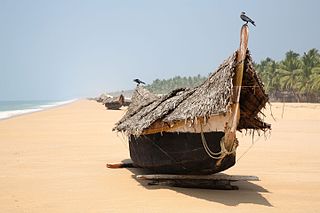Poovar
Poovar is a popular tourist town in the Trivandrum district of Kerala state, South India. This village is almost at the southern tip of Trivandrum while the next village, Pozhiyoor, marks the end of Kerala. This village has a beautiful beach which attracts tourists.
It lies very close to Vizhinjam, a natural harbor. It has an estuary which connects with the sea during high tides. The 56 km Neyyar River passes through Neyyattinkara taluk into the Arabian Sea near Poovar. Its natural beauty enables it to be a quiet tourist spot.
It was a trading center of timber, sandalwood, ivory and spices. In around 1,000 BCE, it is believed that ships owned by King Solomon of Israel landed in Ophir, which is identified by some sources as Poovar, while the village was one of the ancient Muslim settlements along the western coast of India. The central mosque in Poovar was built by Malik Deenar, an eighth century Muslim preacher. During the reign of the Chola dynasty, it was a major port. The explorer Megasthenes, Roman writer Pliny the Elder and Venetian traveller Marco Polo mention connections with Greece and Rome.
There were a merchant named Pokku Moosa Maraikkar who lived in Poovar during the 18th century in a house called Kallaraickal Tharavad, which many times gave shelter to Marthanda Varma (1706–58), king of Travancore from his enemies. Poovar also had trade relations with international markets at this time as well as a well trained army and some ships. At the Battle of Colachel and Battle of Kayamkulam these forces assisted the Travancore army against the Dutch East India Company during the Travancore–Dutch War.
The origin of the name “Poovar” has a story related to Marthanda Varma. Before that it was called Pokkumoosapuram. During internal riots in Travancore and while escaping from the Ettuveetil Pillamar (Lords of the Eight Houses), the king reached Poovar. It was a spring season and the trees on either sides of the Neyyar were full of flowers. These flowers fell into the river making it more attractive. On seeing this pleasant scenery, Marthanda Varma commented that this was poo-var, a conjunction of the Malayalam words for “flower” and “river”.
Source : wikipedia
https://www.youtube.com/watch?v=UdAbmzW4Axw
https://www.youtube.com/watch?v=YNvCg2Q8c9M
https://www.youtube.com/watch?v=XT9sDtchMeU
Reviews



Rate this article